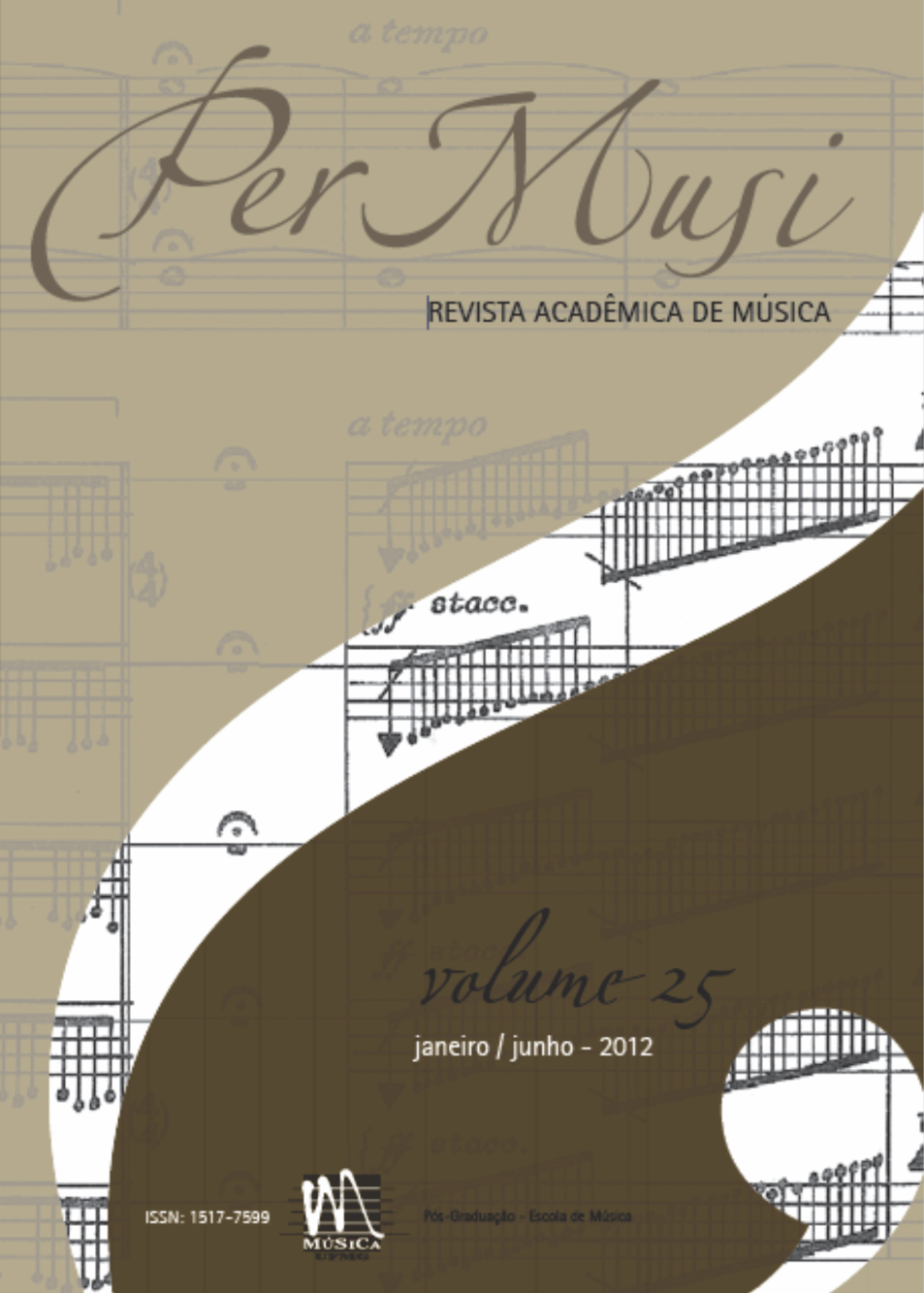La motivación para el desarrollo de trabajo de los músicos de orquesta
Palabras clave:
Ergonomía, Músicos, Orquesta, Motivación, TrabajoResumen
La motivación puede interferir en la profesión musical, principalmente, por la necesidad constante de la práctica instrumental. Así, se buscó identificar los factores relacionados con la motivación para el desarrollo de de 22 instrumentistas de una orquesta semiprofesional de la región sur de Brasil. En general, puede decirse que los instrumentistas están motivados para realizar su trabajo.
Referencias
ADDESSI, A. R.; PACHET, F. Sistemas musicais interativos-reflexivos para educação musical. Cognição e Artes Musicais, v. 2, n.1, p.62-72, 2007.
ALLEN, N. J.; MEYER, J. P. Affective, continuance, and normative commitments to the organization: An examination of construct validity. Journal of Vocational Behaviour, v. 49, p.252-276, 1990.
ARAÚJO, R. C.; PICKLER, L. Um estudo sobre a motivação e o estado de fluxo na execução musical. In: IV SIMPÓSIO DE COGNIÇÃO E ARTES MUSICAIS, 4, Curitiba, 2008. Anais... Curitiba: Universidade Federal do Paraná, 2008.
CARVALHO, A. C.; SILVA, B. V. M. A motivação para o trabalho com enfoque no aspecto financeiro. In: XIII SIMPÓSIO DE ENGENHARIA DA PRODUÇÃO, 13, Bauru, 2006. Anais... Bauru: Universidade Estadual Paulista, 2006.
COSTA, C. P. Contribuições da ergonomia à saúde do músico: considerações sobre a dimensão física do fazer musical. Música Hodie, v. 5, n. 2, p.53-63, 2005.
COSTA, C. P.; ABRAHÃO, J. I. Quando o tocar dói: um olhar ergonômico sobre o fazer musical. Performance Musical, v. 10, p.60-79, 2004.
CUNHA, M. P.; MARQUES, C. A. Relação entre Objectivos/Feedback e Desempenho/Envolvimento/ Satisfação. Análise Psicológica, v. 8, n. 3, p.295-304, 1990.
CUSTODERO, L A. Buscando desafios, encontrando habilidades: a experiência de fluxo e a educação musical. In: ILARI, Beatriz (Org.). Em busca da mente musical. Curitiba: Editora da UFPR, 2006, p.381-399.
EREZ, M. A culture-based model of work motivation. In: EARLY, C.; EREZ, M. (Eds.). New perspectives on international industrial/organizational psychology. San Francisco: The New Lexington Press, 1997. p.193-242.
FERREIRA, A.; DIOGO, C.; FERREIRA, M.; VALENTE, A. C. Construção e validação de uma Escala Multi-Factorial de Motivação no Trabalho (Multi-Moti). Comportamento Organizacional e Gestão, v. 12, n. 2, p.187-198, 2006.
FRAGELLI, T. B.; GÜNTHER, I. A. Relação entre dor e antecedentes de adoecimento físico ocupacional: um estudo entre músicos instrumentistas. Performance Musical, n. 19, p.18-23, 2009.
FUCCI AMATO, R. C. O canto coral como prática sócio-cultural e educativo-musical. Opus, v. 13, n. 1, p.75-96, 2007.
GATES, D. The Philharmonic’s new admiral takes command. Newsweek, v. 138, n. 2, p.56-57, 2001.
JOURDAIN, R. Música, cérebro e êxtase. Rio de Janeiro: Objetiva, 1997.
LOCKE, E. A.; LATHAM, G. P. A theory of goal setting and task performance. Englewood Cliffs, NJ: Prentice-Hall, 1990.
MARTINEZ, M. C.; PARAGUAY, A. I. B. B. Satisfação e saúde no trabalho: aspectos conceituais e metodológicos. Cadernos de Psicologia Social do Trabalho, v. 6, p.59-78, 2003.
MCCLELLAND, D. C. Human Motivation. Cambridge: Cambridge University Press, 1987.
MCCORNICK, J.; MCPHERSON, G. E. The role of self-efficiancy in a musical performance examination: an exploratory structural equation. Psychology of Music, v. 31, n. 1, p.37-51, 2003.
MCCORNICK, J.; MCPHERSON, G. E. Self-efficacy and performing music. Psychology of Music, v. 3, n. 3, p.321-336, 2006.
MENDES, A. M.; ABRAHÃO, J. I. Organização do trabalho e vivências de prazer-sofrimento do trabalhador: abordagem psicodinâmica. Psicologia: Teoria e Pesquisa, v. 12, p.179-184, 1996.
REGO, A. Os motivos de sucesso, afiliação e poder: desenvolvimento e validação de um instrumento de medida. Análise Psicológica, v. 18, n. 3, p.335-344, 2000.
SKINNER, B. F. Recent issues in the analysis of behaviour. Columbus: Merrill Publishing Company, 1989.
TAMAYO, A.; PASCHOAL, T. A relação da motivação para o trabalho com as metas do trabalhador. Revista de Administração Contemporânea, v. 7, n. 4, p.33-54, 2003.
Descargas
Publicado
Número
Sección
Licencia

Esta obra está bajo una licencia internacional Creative Commons Atribución 4.0.

Excepto cuando se indique lo contrario, el contenido de este sitio está sujeto a una Licencia Creative Commons - Atribuição 4.0 Internacional.












